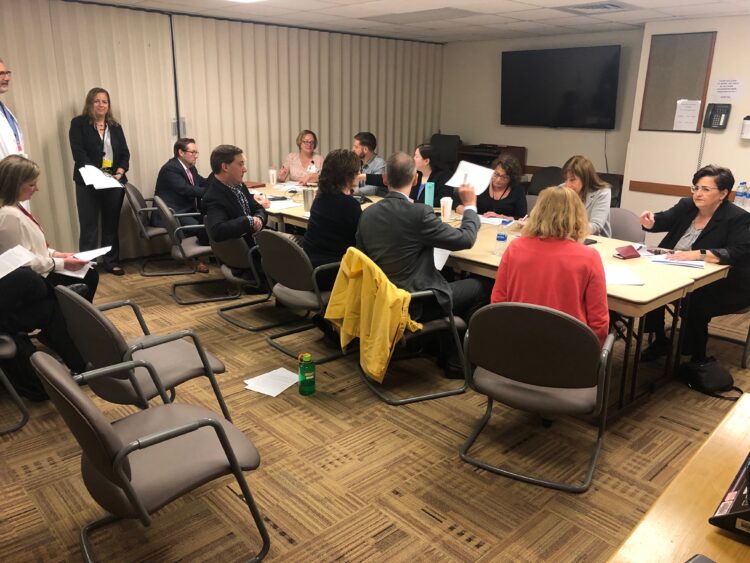Health care organizations join Peer Support Program pilot
Thirteen* hospitals and outpatient practices in Massachusetts have pledged to support their clinicians and staff members with networks of trained colleagues that can be activated when a peer is involved in an event that harmed a patient. The organizations are participating in a pilot program offered by the Betsy Lehman Center that will provide the consultation, hands-on training and implementation support needed for each institution to build its own sustainable peer support network.
- Baystate Health
- Boston Medical Center
- Cooley Dickinson Health Care
- Dana-Farber Cancer Institute
- Emerson Hospital
- Lowell General Hospital/Circle Health
- Massachusetts General Hospital
- MetroWest Medical Center
- Newton-Wellesley Hospital
- North Shore Medical Center
- South Shore Hospital
- Southcoast Health System
- Tufts Medical Center
The pilot is part of a larger effort by the Center to ensure that all individuals – patients, family members, health care professionals and staff – affected by medical harm or a difficult outcome get the support they need from others who have had a similar experience. Peer support can help both professionals and patients or family members cope with difficult feelings, such as isolation, anger, guilt and frustration, in the aftermath of such an event.
The Clinician and Staff Peer Support Program pilot, with 13 organizations participating, will jump start the process and inform future efforts with research and feedback about best practices.The pilot program includes large academic medical centers, smaller community hospitals and outpatient practices from across the state.
Key takeaways
The challenge
Many health care workers, as well as patients and family members, find themselves coping alone with the emotional effects of medical errors, patient harm and unexpected outcomes.
The solution
Peer support is an effective way to assist patients, family members and health care workers following adverse events.
Image: The team at South Shore Hospital meets to begin work on its Peer Support Program.
In late 2018, with help from the Massachusetts Health and Hospital Association (MHA), the Betsy Lehman Center reached out to hospitals in the Commonwealth to gauge interest in the peer support initiative. All 13 organizations that performed an initial review of the program’s expectations, followed by meetings between the Center’s staff and top executives and clinical leaders, said they were ready to commit to the pilot.
Steve Walsh, MHA’s President and C.E.O., says, “The MHA Board of Trustees enthusiastically supports participation in this peer support model. While we initially expected to pilot the program with five hospitals, we ended up with three times that number.”
Linda Kenney, Director of Peer Support Programs at the Betsy Lehman Center, is impressed by the strong response from organizations across the state. Kenney notes, “Peer support requires lots of hard work on the part of hospitals and outpatient practices. It’s amazing to see the interest and commitment that leaders in so many organizations have shown for this pilot program, which will benefit their staff in many ways.”
It’s amazing to see the interest and commitment that leaders in so many organizations have shown for this pilot program, which will benefit their staff in many ways.
Kenney and Jacqueline Ewuoso, Program Manager at the Center, have started work with nine of the 13 organizations to develop multidisciplinary advisory committees composed of department heads, physicians, nurses, chaplains and others who will oversee on-site implementation. While there will be similarities among the peer support programs, each will be tailored to the unique needs of the hospital or facility. Plans are in place to kick-off peer support work with the remaining organizations, including the ambulatory practices, to be sure each group gets off to a strong start.
“Massachusetts hospitals recognize that caregivers and staff members are often reluctant to reach out for help following an incident for fear of being stigmatized or compromising collegial relationships,” says Walsh. “We anticipate this guidance from the Betsy Lehman Center will be tremendously helpful in our efforts to ensure that caregivers don’t try to ‘go it alone’ after a traumatic event.”
Patient and family peer support outreach
The Center’s peer support work also extends to patients and family members affected by adverse medical outcomes. In the coming weeks, the Center will begin its outreach efforts to connect with individuals in the state who have experienced medical harm and are interested in serving as a network of support for others.
“We're excited to have Linda directing our work on peer support,” says Barbara Fain, Executive Director of the Betsy Lehman Center. “It’s so important that we recognize how medical errors impact everyone involved and make sure to help those who are most affected. Support from peers can make a real difference in the lives of so many.”
*Update: The initial article named 15 organizations as participants in the pilot program. Two have since deferred their involvement and the number of participating organizations has been changed to 13 throughout the article.
